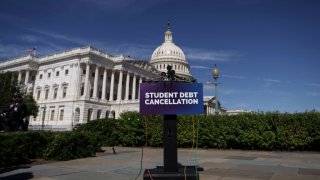
- Student loan repayment is an increasingly talked about workplace benefit that many employees under the financial strain of student debt want to see in a job, and it might become more critical as the Supreme Court considers whether to uphold a lower court ruling against the Biden plan.
- Hundreds of companies from Fidelity Investments to Aetna, Abbott, Google and Peloton are offering some form of this financial assistance to workers.
- Some companies offer a direct student debt payment match; others offset the cost by adding more money to an employee retirement savings plan, with the latter likely to be even more popular if new retirement legislation is passed by Congress.
The Biden student debt-relief plan remains stuck in legal limbo, but some borrowers have a saving grace: their employer.
Companies have stepped up in recent years to help student loan borrowers throw off the yoke of debt. They are doing this in several ways, including offering direct assistance or through relief tied to employees' retirement savings.
There's broad support for making student loan debt assistance more readily available as a workplace benefit, and retirement legislation being considered by Congress may soon add momentum. Among Americans with student loans, 87% somewhat or strongly agree that college savings plans and student loan debt solutions are important workplace benefits for employers to offer, according to a June survey from Voya Financial. What's more, among Americans with student loans, 84% said they would be more likely to work for an employer that offered help paying off student loan debt.
Get San Diego local news, weather forecasts, sports and lifestyle stories to your inbox. Sign up for NBC San Diego newsletters.
Companies spend tremendous amounts of money to recruit top talent, yet retention remains a vexing issue, especially amid the Great Resignation. Benefits are one reason employees choose to stay with a company, and student loan repayment is an increasingly talked about benefit given the financial stress it causes, said Matthew Kerzner, a managing director with consulting firm Eisner Advisory Group.
While many companies are waiting to see what happens with the Biden forgiveness plan — which hit another snag this week when a federal appeals court on Wednesday declined to put on hold a Texas judge's ruling that said the plan to cancel the debt was unlawful, and the the Supreme Court said it would consider the case but uphold the lower court ruling for now — many others are recognizing the need for action.
The Goodly Jobs Board, which lets job seekers find companies that help repay their workers' student loans, lists more than 250 companies — small to large — offering this type of benefit. FlexJobs, meanwhile, has identified 30 companies, including Aetna, Google, Fidelity Investments and Peloton, that assist with student loan repayment and that also hire for remote work, another highly desired perk.
Money Report
Student loan debt repayment may not start again until August 2023, but it will eventually be back. Here are a few workplace benefits increasing in popularity that will be even more helpful in attracting and retaining workers and helping them pay off student debt if President Biden's plan to wipe out a portion of the $1.6 trillion in debt fails.
Company match of student loan payments
Companies offer various types of student loan assistance programs, with varying eligibility requirements, yearly caps and maximum benefit amounts. Each program is different, so employees should be sure to understand the particulars of their company's program.
Some employers have chosen to offer the perk as a company match, which is ideal because it helps encourage employees' financial responsibility, said Kristen Carlisle, general manager of Betterment at Work, which administers these types of benefits.
For employees, there's an added benefit, at least through 2025. For the next few years, thanks to Covid-relief legislation, employers can make contributions of up to $5,250 per employee annually, tax-free to the employee, for education expenses such as student loan assistance. Even if a company contributes more than the $5,250 so that a portion is taxable, or the tax-free advantage sunsets, helping reduce student debt still leaves the employee in a better position, Kerzner said.
Student debt relief tied to retirement savings
Another approach, pioneered by Abbott, encourages employees to pay off student debt in exchange for retirement savings contributions. In Abbott's case, when employees show they are using at least 2% of their eligible pay to chip away at student loans, the company contributes 5% to their 401(k) accounts. The company received permission from the IRS to structure its program this way and other companies are starting to follow suit.
This type of program could gain additional steam with the potential passage of retirement legislation, dubbed SECURE 2.0, that is working its way through Congress. Provisions within the legislation would allow for more companies to support employees through this type of student debt relief tied to retirement savings. Even if it doesn't pass this year, confidence is high that it will in 2023, Carlisle said.
Employers are interested in providing this type of relief because it not only helps with student loan debt, but it also encourages long-term savings, said Jeff Cimini, senior vice president of retirement product management at Voya Financial. Among employed Americans with student loans, 91% somewhat or strongly agree they would save more money for retirement if their employer helped pay off their student loan debt, according to recent Voya data.
Since the Abbott program launched in 2018, about 1,900 employees have signed up. In 2021, the average monthly enrollment was 50% higher than in 2019, according to the company.
"Student loan debt is one of the many things that impact short-term financial security. People who feel better about their short-term financial security are more likely to set aside money or invest for the long-term," Cimini said.
Debt management advice and tools
Some companies are also providing debt-management tools that help employees self-manage their student loans. This can be a huge value-add, Carlisle said, because it helps employees get a full picture of their student loans. This includes understanding the interest they are paying and advice and guidance on how to pay down debt, while saving for other financial goals. "Employers really need to be thinking about this as part of their benefits program," she said.
Remember: Biden can't wipe out all $1.6 trillion in debt
Even if Biden's plan to cancel up to $20,000 in federal student debt is allowed to proceed, it's still not enough for many of the roughly 43 million federal student loan borrowers who collectively owe around $1.6 trillion, according to professionals who help borrowers with student loan issues.
Although the pandemic-induced repayment pause, in force since March 2020, has again been extended, it kicks the can down the road, but doesn't eliminate the problem entirely, they said. There is also about $131 billion in outstanding private student loan debt, according to data and analytics company MeasureOne, that isn't subject to the federal payment pause, or Biden's cancelation plan.
It's an opportunity for companies to add a benefit that can have a meaningful effect on employees and retention. "It's a wonderful retention tool," Kerzner said.






